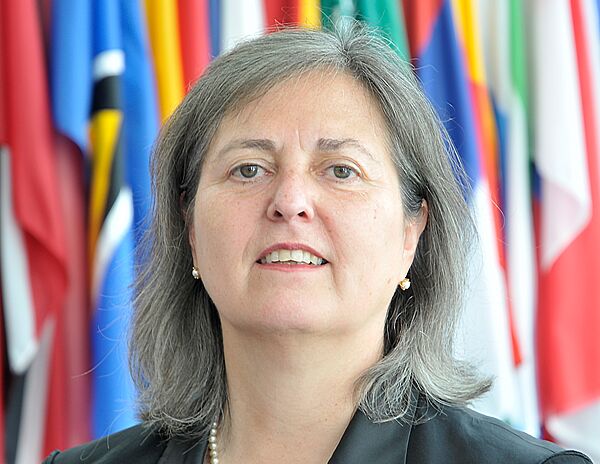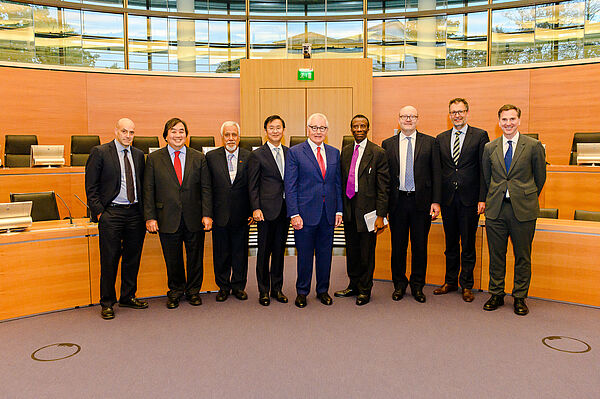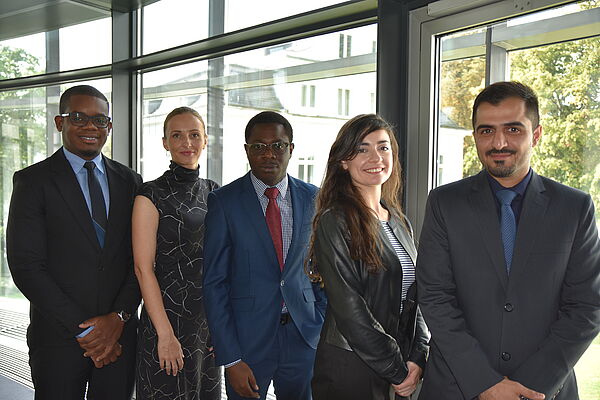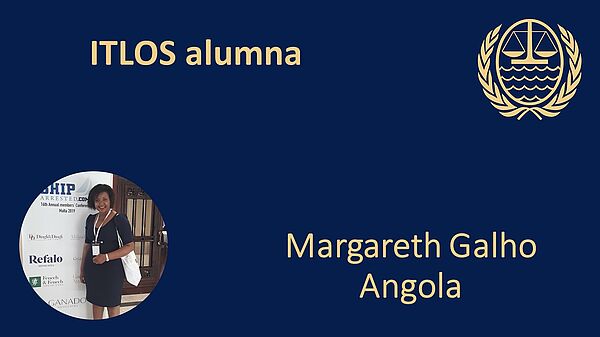Newsletter 2019/4
November 2019
Introduction
Many of our readers will be aware that we are approaching the 25th anniversary of the United Nations Convention on the Law of the Sea. Anniversaries often provide an opportunity to reflect on past achievements, and the Convention’s first quarter century is a fitting moment for such a review, to evaluate how the dispute-settlement procedure has fared over the years.
Two stimulating events in recent weeks have allowed me to do just that. Last week I was a panellist in a discussion on “The ICJ and ITLOS – Is there a place for judicial dialogue?” during the International Law Week at the United Nations, organized by the Permanent Missions of the Republic of Korea, the Republic of Singapore and Slovakia, and held in New York. That event followed on the heels of a conference, organized in Hamburg by the Hamilton Lugar School of Global and International Studies, the University of Hamburg and the International Foundation for the Law of the Sea and held at the Tribunal in mid-October, to mark the Convention’s anniversary and to consider the state of its health.
It is my opinion that the Convention has been successful in ensuring that the rule of law applies among States and operates across the world’s oceans and that justice can be done for all States, big or small, strong or weak, developed or developing. Looking at the comprehensive dispute-settlement system of the Convention – one of the major achievements of the Third United Nations Conference on the Law of the Sea – I feel that it has played a significant role in this regard, and this is where the discussions at the New York event were so relevant. For, in answer to the question as to whether Part XV laid the groundwork for the fragmentation or the fertilization of international law, I was happy to note that the decisions of the two permanent bodies of the Part XV system are mutually reinforcing, particularly in the area of maritime delimitation and international environmental law. Together, the Tribunal and the Court contribute towards a cohesive framework of governance for the oceans, which is precisely what the drafters of the Convention were aiming for, thereby enhancing the standing of the rule of law for the oceans rather than dismantling it.
The Hamburg conference posed the question “How healthy is the ocean’s constitution?” As I said in my keynote statement at the conference, it is my assessment that the legal regime created by the Convention has worked fairly well in promoting the rule of law at sea. The UNCLOS regime is solid yet flexible enough to accommodate necessary changes – as evidenced by the fact that, since its entry into force, two additional implementing agreements have been adopted, with a third currently under negotiation. I am pleased to report that over two days of most interesting presentations and debates, speakers and experts from around the world agreed that the Convention has stood the test of time and is still valid today.
The dispute-settlement procedure established under Part XV may be seen as somewhat complicated, with States which have not made a declaration under article 287 or those which have not accepted the same settlement procedure being automatically channelled towards the default mechanism of arbitration in accordance with Annex VII. In this connection, the latest case submitted to the Tribunal concerning delimitation of the maritime boundary between the Republic of Mauritius and the Republic of Maldives in the Indian Ocean is a good example of how other avenues are open for States seeking a peaceful resolution to their dispute. In the absence of a declaration of either State under article 287, arbitral proceedings under Annex VII to the Convention were initiated by Mauritius in June of this year. In September, the Parties agreed to enter into a special agreement to transfer the arbitral proceedings to the Tribunal. This is the third time that a maritime delimitation case has been brought to the Tribunal, or a special chamber of the Tribunal, by special agreement, and the fifth time that arbitral proceedings have been transferred to the Tribunal. The Special Chamber formed by the Tribunal with the consent of the Parties is constituted pursuant to article 15, paragraph 2, of the Tribunal’s Statute and consists of seven judges from the Tribunal together with two judges ad hoc chosen by the Parties.
The fact that two States have once again chosen to enter into a special agreement conferring jurisdiction on the Tribunal underlines the role that the Tribunal can play as a global adjudicatory body entrusted with the specific mandate of resolving law of the sea disputes between States parties to the Convention. As the only permanent judicial institution to have been created by the Convention, it has the duty to act as a judicial guardian of the legal order of the oceans. The Tribunal is conscious of this role: it has performed its function conscientiously through its reasoned decisions and jurisprudence, and will continue to do so.
With my warmest regards,
Jin-Hyun Paik
President
Interview with Ximena Hinrichs Oyarce, Registrar of the Tribunal

What experience do you bring with you to the position of Registrar?
After graduating in law from the Universidad de Concepción in Chile, I decided early in my career to specialize in international law and law of the sea when I enrolled in the LLM and PhD programmes at the University of Hamburg. With this in mind, I wrote my doctoral dissertation on the subject of the exclusive economic zone and the practice of Latin American States, under the guidance of Professor Rainer Lagoni, being inspired by the contribution that Chile and several Latin American States had made to the establishment of this new maritime zone. I began writing my dissertation when the future of UNCLOS was still uncertain but fortunately, before I finished it, the Convention entered into force, in November 1994. Thereafter, I had the opportunity to pursue my interest in the law of the sea and maritime matters at the International Maritime Organization (IMO), working on a project to assess the implications for the IMO of the entry into force of the Convention.
I joined the Tribunal in April 1997 in a junior legal position and was promoted over the years to senior posts, including Head of the Legal Office and Deputy Registrar. This experience has given me an in-depth knowledge of the Tribunal’s procedures, jurisprudence and administrative functioning. As a culmination of more than 20 years of work with the Tribunal, I was recently appointed Registrar. If I look back on the beginning of my career, I never imagined that I would be nominated to the highest office of Registrar. I am therefore honoured and thankful for the confidence that the judges of the Tribunal have vested in me.
As time permits, I seek to undertake other activities. With a view to disseminating knowledge concerning the law of the sea, dispute-settlement procedures and the work of the Tribunal, I regularly engage in academic activities, draft publications and participate in conferences.
What is the role of the Registrar?
The Registrar is the head of the Registry, which provides fundamental support to the Tribunal’s functioning and work. Under the supervision of the President, the Registrar organizes judicial proceedings and communicates to this effect with the parties to a case, in accordance with the Tribunal’s procedural rules. Through the Registry, the Registrar also manages the provision of legal and administrative support to the judicial work of the Tribunal and its biannual sessions. The Registrar liaises with the States parties to the Convention, preparing documentation for the Meeting of States Parties and issuing relevant notifications. As head of the Registry, the Registrar is responsible for the administrative work of the Tribunal and its financial administration. The Registrar also assists in maintaining relations with the host country and other international organizations and bodies.
What opportunities and challenges do you see for the Registry?
With only 38 staff members, the Registry is rather small. It is, however, well-organized and provides optimal services to the Tribunal and parties to cases. I wish to acknowledge the dedication and hard work of the former Registrar, Mr Philippe Gautier, which greatly contributed to this end. I wish to continue this pattern, while developing my own style of management. With the aim of securing the provision of optimal services, I intend to encourage well-organized work, smooth running of processes and timely execution of tasks within the Registry. Facilitating dialogue and building a strong team spirit are also essential. It should be borne in mind that an efficient and effective Registry may also be attractive to States when considering bringing a case to the Tribunal.
ITLOS Conferences and Events
Judge Heidar gave a keynote address to the Pacific Islands Forum Fisheries Agency judicial symposium on “'Responsibility in fisheries” on the topic “IUU fishing and the ITLOS advisory opinion” in Honiara, Solomon Islands, on 5 August 2019. As President of the Chamber for Fisheries Disputes, Judge Heidar described how the 2015 Advisory Opinion issued following the submission of a request by the Sub-Regional Fisheries Commission elaborates on the responsibilities of coastal States and flag States in combatting illegal, unreported and unregulated fishing within the exclusive economic zone.
At the law of the sea conference entitled “New developments in the law of the sea and the role of ITLOS”, organized jointly by the Republic of Korea and ITLOS and held on 20 and 21 August 2019 in Seoul, President Paik delivered a keynote speech and Vice-President Attard, Judges Kateka, Heidar and Lijnzaad and Registrar Hinrichs Oyarce participated in panel discussions relating to climate change, marine biodiversity, seabed mining, and dispute settlement.
President Paik delivered a keynote speech entitled “The role of the International Tribunal for the Law of the Sea in the settlement of disputes related to the law of the sea: Current trends and other developments” at a special forum held on the side lines of the 7th Biennial Conference of the Asian Society of International Law (AsianSIL), Quezon City (Philippines) on 22 August 2019.
Back in Hamburg, at the conference organized for the 25th anniversary of the entry into force of UNCLOS by the Hamilton Lugar School of Global and International Studies, the University of Hamburg and the International Foundation for the Law of the Sea, President Paik gave the keynote statement and Judge Heidar participated in a panel discussion on “Ocean jurisprudence and dispute resolution”.

Back in Hamburg, at the conference organized for the 25th anniversary of the entry into force of UNCLOS by the Hamilton Lugar School of Global and International Studies, the University of Hamburg and the International Foundation for the Law of the Sea, President Paik gave the keynote statement and Judge Heidar participated in a panel discussion on “Ocean jurisprudence and dispute resolution”.
Capacity Building

ITLOS-Nippon capacity-building and training programme on dispute settlement under UNCLOS
After attending the IFLOS Summer Academy in August, the Fellows (Nayef Isa Alshaikh (Bahrain), Balmaceda Paula Constanza Aida Nuno (Chile), Meles Jean-Raoul Esmel (Côte d’Ivoire), Joshua F. Benn (Guyana) and Deima Savukynaite (Lithuania)) have started their lecture series, looking at topics such as: sources of international law and UNCLOS; international dispute settlement; state responsibility; dispute settlement under the Convention; limitations and exceptions under Part XV; arbitral proceedings; conciliation; ITLOS jurisprudence; ocean governance; responsibility of States for activities in the Area and fishing in the EEZ of other States; the Fish Stocks Agreement and RFMOs; international fisheries law; the role of RFMOs and the CCAMLR; environmental principles and ITLOS; and protection of the marine environment. Practical training exercises on the role of the hydrographer and the use of maps, negotiations and legal writing, and oral advocacy have given the Fellows an opportunity to hone their skills in these domains, with a trip to the International Court of Justice and the GEOMAR Helmholtz Centre for Ocean Research Kiel rounding off their busy schedule.
Internship programme
After three months at the Tribunal, Ms Mariam Mgeladze (Georgia), Mr Aref Shams (Iran), Mr Carlos Cruz Carrillo (Mexico) and Mr N’kouleté Yaovi Kpadenou (Togo) left in September, after a closing presentation of their research on the topics “Some legal issues related to freedom of navigation in the Black Sea region”, “Climate emergency and legal uncertainty: ITLOS advisory opinion on climate change and oceans”, “A legal analysis of utilizing icebergs for freshwater” and “Le renforcement du dispositif juridique de la Convention relative à la coopération en matière de protection et de mise en valeur du milieu marin et des zones côtières de la région de l’Afrique de l’Ouest et du Centre, 23 mars 1981 (Convention d’Abidjan)”. The current group of interns, Wenlan Yang (China), Maximilian Blasek (Germany), Anita Rayegani (Canada/Hungary) and Wendy Okun (Kenya), arrived in October and are working in the Legal and Press Offices.
IFLOS Summer Academy
We congratulate the 41 participants from 28 States who successfully graduated from the 13th IFLOS Summer Academy “Promoting ocean governance and the peaceful settlement of disputes”.
Regional workshops
The Montevideo workshop will take place on 13 and 14 November 2019.
Meet the ITLOS Alumni

Ms Margareth Galho (ITLOS-Nippon Fellow 2011-2012), General Manager of Margareth Galho & Associados
My experience at ITLOS has undoubtedly had an enormous impact on my mind-set, my goals and my career.
As a Senior Legal Adviser of the National Commission of Angola, empowered to deal with the country’s maritime delimitation, I was expected to advise the government on various issues related to the law of the sea. This included advising on the role of the Tribunal, on dispute settlement under UNCLOS, and on the development of international jurisprudence in this field. The ITLOS-Nippon programme was a perfect opportunity for me to develop my skills in this area and I was fortunate to be selected as a fellow and to attend the programme, which has re-shaped how I see litigation and the role of UNCLOS in dispute settlement.
On my return to Angola, at first I continued to be part of the delegation of Angola for the Meeting of States Parties to UNCLOS. A few years later, I decided to join the national oil company, SONANGOL, working in the shipping subsidiary owing to my expertise in dispute settlement under UNCLOS and also on issues concerning the continental shelf. In the meantime I updated my thesis and published it under the title “The West Africa maritime boundaries”. In 2017 I founded “Margareth Galho & Associados”, a licensed law-firm, and with much effort and hard work, the firm has started to grow and gain a reputation in the market.
Since then a lot has happened: working as a woman in the maritime industry is an enormous challenge anywhere in the world. Being young and female has always been considered an obstacle among Angolan law practitioners, where age and experience command respect. I realized that if I wanted to contribute on a bigger scale, I needed to establish and develop a reputation in both local and international markets and joined the most influential group of women within the industry, WISTA – Women in International Shipping and Trade Association, and the gold star of Africa, WIMA – Women in Maritime Africa. I became WISTA’s president for Angola and Adviser of the WIMA. In this role I participated in the “Empowering women in the maritime community” conference at the World Maritime University in Malmö in April 2019, joining over 350 participants from more than 70 countries in addressing the gender gap in the maritime, oceans, ports and fishing and related industries.
Performing within a niche market in the male-dominated maritime industry has made me determined to focus not on organic growth but on quality, expertise and services for our clients. My latest project involves the organization of annual seminars in Angola on the subject “The legal and technical aspects of the maritime industry and the law of the sea”. The first seminars took place in Luanda, in two locations, at the ITEL – Telecommunication Institute, at Rangel CTT, and the ISPTEC – SONANGOL Institute in Talatona, on 22 and 25 March 2019, respectively. The second seminars are scheduled to take place on 24 and 25 March 2020.
I have come to realize that ITLOS has changed my life: even though my initial focus was on maritime delimitation, baselines and the continental shelf, other topics such as the prompt release of ships came to the fore and became of great relevance when I joined the Angolan national oil company. Whether arresting ships in Angola or elsewhere or managing the workload of the firm where junior lawyers and paralegals need training and senior lawyers need exclusive support, my ITLOS experience has always come in handy. The opportunities I have to attend conferences and give presentations, such as my recent presentation to ITLOS fellows and interns, are to be relished
Upcoming Events
14th ITLOS regional workshop, Montevideo, 13-14 November 2019

